:LLINe:LOAD:FNAMe
Command Syntax
:LLINe{1:64}:LOAD:FNAMe "<path substitution string>\subfolder\filename.lltx"
Where the {1:64} specifier identifies one of 64 possible limit lines. For example, :LLINe23.
Where the "<path substitution string> is a string that expands into a specific file path. For example, %USER_DATA_DIR%.
Where the "subfolder" is an optional path folder. For example, %USER_DATA_DIR%\Limit Lines.
Query Syntax
:LLINe{1:64}:LOAD:FNAMe?
Description
Specifies the filename (*.lltx), path, and extension of the target limit-line file to load. After the file loads, you can display the limit line using the :LLINe:DISPLay sibling command.
Default User and Demo Folders

The default user data folder for storing limit-line files is in %USER_DATA_DIR%\Limit Lines as shown in this picture. It is good practice to include a path substitution string with the filename. For example, %USER_DATA_DIR%\Limit Lines\filename.
The default demo folders for loading limit-line files is in %DEMO_DIR%\Limit Lines\Demo as shown in the following picture. It is good practice to include a path substitution string with the subfolders and filename. For example, %DEMO_DIR%\Limit Lines\Demo\filename.
Including a path substitution string in the filename ensures that the file will be saved in (or loaded from) the desired folder. Failure to do so may result either in a file created in an parent folder or a file error. Do not append a filename extension as the extension is automatically added.

Requires FlexDCA revision A.04.50 and above.
Example Command Sequence
:LLINe2:LOAD:FNAMe "%USER_DATA_DIR%\Limit Lines\LimitLine.lltx" :LLINe2:DISPlay ON